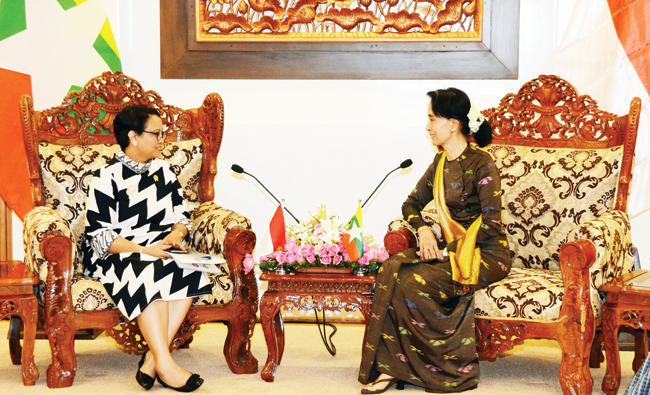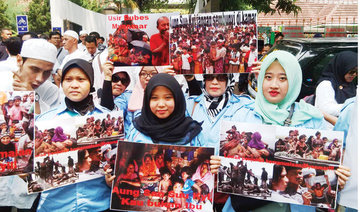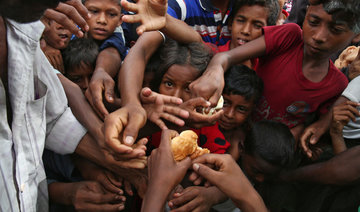YANGON: Muslim countries in Asia led a growing chorus of criticism on Monday aimed at Myanmar and its civilian leader Aung San Suu Kyi over the plight of its Rohingya Muslim minority.
Nearly 90,000 Rohingya have flooded into Bangladesh in the past 10 days following an uptick in fighting between militants and Myanmar’s military in strife-torn western Rakhine state.
The impoverished region bordering Bangladesh has been a crucible of communal tensions between Muslims and Buddhists for years, with the Rohingya forced to live under apartheid-like restrictions on movement and citizenship.
The recent violence, which kicked off last October when a small Rohingya militant group ambushed border posts, is the worst Rakhine has witnessed in years with the UN saying Myanmar’s army may have committed ethnic cleansing in its response.
De facto leader Suu Kyi, a former political prisoner of Myanmar’s junta, has come under increasing fire over her perceived unwillingness to speak out against the treatment of the Rohingya or chastise the military.
The growing crisis threatens Myanmar’s diplomatic relations, particularly with Muslim-majority countries in Southeast Asia where there is profound public anger over the treatment of the Rohingya.
Indonesia’s Foreign Minister Retno Marsudi met Suu Kyi as well as Myanmar’s Army Chief Gen. Min Aung Hlaing in Naypyidaw on Monday in a bid to pressure the government to do more to alleviate the crisis.
“Once again, violence, this humanitarian crisis has to stop immediately,” Indonesian President Joko Widodo told reporters on Sunday as he announced Retno’s mission there.
Hours before Widodo spoke, a petrol bomb was thrown at Myanmar’s embassy in Jakarta.
Iranian Foreign Minister Javad Zarif added in a recent tweet: “Global silence on continuing violence against #Rohingya Muslims. Int’l action crucial to prevent further ethnic cleansing — UN must rally.”
Muslim-majority Malaysia has also seen public protests since the latest round of Rakhine violence began.
“We urge for calm and restraint,” Prime Minister Najib Razak tweeted. “The dire situation facing our Rohingya brothers and sisters must be alleviated for good of Myanmar and region.”
Despite years of persecution, the Rohingya largely eschewed violence until October’s attacks by the little-known Arakan Rohingya Salvation Army.
Analysts have long warned that Myanmar’s treatment of the Rohingya would lead to homegrown militancy.
Since the latest fighting broke out, Al-Qaeda’s offshoot in Yemen has called for retaliatory attacks against Myanmar while the Afghan Taliban posted a statement on Facebook calling on Muslims to “use their abilities to help Myanmar’s oppressed Muslims.”
Defenders of Suu Kyi say she is severely limited in her ability to control Myanmar’s notoriously abusive military.
The Rohingya are also widely loathed by a huge section of Myanmar’s population, dismissed as Bangladeshi interlopers despite many tracing their lineage back generations.
That makes supporting them hugely unpopular.
But detractors say Suu Kyi is one of the few people in Myanmar with the mass appeal and moral authority to swim against the tide on the issue.
Suu Kyi and Myanmar face chorus of anger over Rohingya crisis
Suu Kyi and Myanmar face chorus of anger over Rohingya crisis














